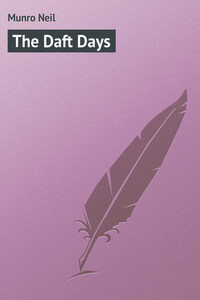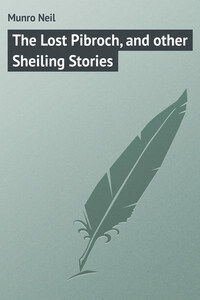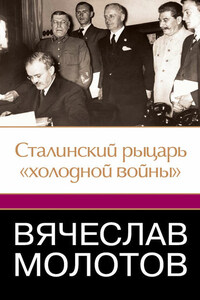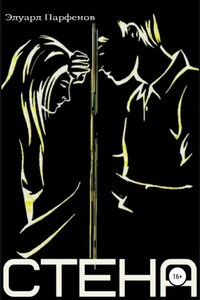The town’s bell rang through the dark of the winter morning with queer little jolts and pauses, as if Wanton Wully Oliver, the ringer, had been jovial the night before. A blithe New-Year-time bell; a droll, daft, scatter-brained bell; it gave no horrid alarums, no solemn reminders that commonly toll from steeples and make good-fellows melancholy to think upon things undone, the brevity of days and years, the parting of good company, but a cheery ditty – “boom, boom, ding-a-dong boom, boom ding, hic, ding-dong,” infecting whoever heard it with a kind of foolish gaiety. The burgh town turned on its pillows, drew up its feet from the bed-bottles, last night hot, now turned to chilly stone, rubbed its eyes, and knew by that bell it was the daftest of the daft days come. It cast a merry spell on the community; it tickled them even in their cosy beds. “Wanton Wully’s on the ran-dan!” said the folk, and rose quickly, and ran to pull aside screens and blinds to look out in the dark on window-ledges cushioned deep in snow. The children hugged themselves under the blankets, and told each other in whispers it was not a porridge morning, no, nor Sunday, but a breakfast of shortbread, ham and eggs; and behold! a beautiful loud drum, careless as ’twere a reveille of hot wild youths, began to beat in a distant lane. Behind the house of Dyce the lawyer, a cock that must have been young and hearty crew like to burst; and at the stables of the post-office the man who housed his horses after bringing the morning mail through night and storm from a distant railway station sang a song, —
“A damsel possessed of great beauty
Stood near by her own father’s gate:
The gallant hussars were on duty;
To view them this maiden did wait.
Their horses were capering and prancing,
Their accoutrements shone like a star;
From the plains they were quickly advancing, —
She espied her own gallant hussar.”
“Mercy on us! six o’clock!” cried Miss Dyce, with a startled jump from her dreams to the floor of her bedroom. “Six o’clock on the New Year’s morning, and I’ll warrant that randy Kate is sound asleep yet,” she said, and quickly clad herself and went to the head of the stair and cried, “Kate, Kate! are ye up yet, Kate? Are ye hearing me, Kate MacNeill?”
From the cavern dark of the lower storey there came back no answer.
She stood with a curious twirly wooden candlestick in her hand in the midst of a house that was dead dumb and desperate dark, and smelled deliciously of things to eat. Even herself, who had been at the making of most of them the day before, and had, by God’s grace, still much of a child’s appetite, could not but sniff with a childish satisfaction at this air of a celestial grocery – of plum-puddings and currant-buns, apples and oranges, cordials and spices, toffee and the angelic treacly sweet we call Black Man, – her face lit rosily by the candle lowe, a woman small and soft and sappy, with the most wanton reddish hair, and a briskness of body that showed no sign as yet of her accomplished years. What they were I will never tell you; but this I’ll say, that even if they had been eighty she was the kind to cheerily dance quadrille. The daft bell, so plainly in the jovial mood of Wanton Wully Oliver, infected her: she smiled to herself in a way she had when remembering droll things or just for simple jollity, and whoever saw Bell Dyce smile to herself had never the least doubt after that she was a darling. Over the tenements of the town the song of the bell went rollicking, and in its hiccupping pauses went wonderfully another sound far, far removed in spirit and suggestion – the clang of wild geese calling: the “honk, honk” of the ganders and the challenge of their ladies come down adrift in the snow from the bitter north.
But there was no answer from the maid in the kitchen. She had rolled less deliberately than was usual from her blankets to the summons of the six o’clock bell, and already, with the kitchen window open, her bounteous form surged over the two sashes that were always so conveniently low and handy for a gossip with any friendly passer-by on the pavement. She drank the air of the clean chill morning dark, a heady thing like old Tom Watson’s autumn ale, full of the sentiment of the daft days. She tilted an ear to catch the tune of the mail-boy’s song that now was echoing mellow from the cobwebbed gloom of the stable stalls, and making a snowball from the drift of the window-ledge she threw it, womanwise, aimlessly into the street with a pretence at combat. The chill of the snow stung sweet in the hot palm of her, for she was young and strong.
“Kate, you wretch!” cried a voice behind her. She drew in her head, to find her mistress in the kitchen with the candlestick in her hand.
“Oh, m’em,” cried the maid, no way abashed, banging up the window and hurriedly crushing her more ample parts under the final hooks and eyes of her morning wrapper – “oh, m’em, what a start you gave me! I’m all in a p-p-palpitation. I was just takin’ one mouthful of air and thinkin’ to myself yonder in the Gaelic that it was time for me to be comin’ in and risin’ right.”










